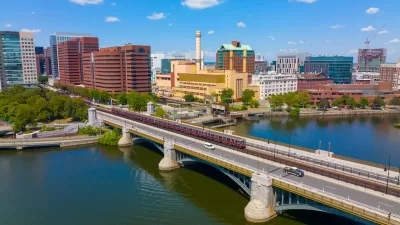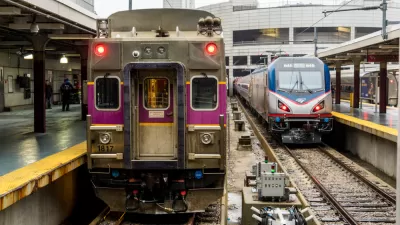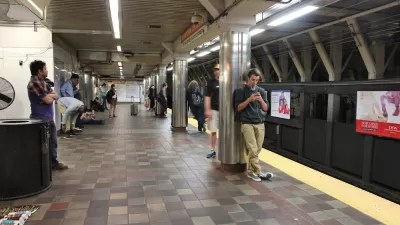A spate of recent development agreements have generated extra cash to run additional transit service on the MBTA system in Boston.

"As debate roars over how to fund improvements to Greater Boston’s dysfunctional mass transit system, state officials are increasingly pressuring real estate developers to pitch in," reports Tim Logan.
"In recent months, they have reached agreements with developers of two big projects north of downtown to pay for extra service on the MBTA’s Orange Line," adds Logan.
Logan explains that developers have traditionally funded improvements to transit stations, not transit service, in development agreements. The first example of the new model came in 2015, when the developer of the Encore casino agreed to spend $7.4 million to fund extra service.
More recently, "developers of Hood Park — an eight-building campus of office space and housing near Sullivan Square — agreed to pay about $830,000 over 15 years for one extra Orange Line train during early afternoon rush hour," according to Logan. Other recent examples are included, as well as the context set by the MBTA's operating budget and the region's booming real estate market.
The story follows shortly after controversies in the region over service failures, and a call from the regional tech sector to raise new revenues to improve public transit service.
FULL STORY: Developers pressed to fund extra T service

Planetizen Federal Action Tracker
A weekly monitor of how Trump’s orders and actions are impacting planners and planning in America.

San Francisco's School District Spent $105M To Build Affordable Housing for Teachers — And That's Just the Beginning
SFUSD joins a growing list of school districts using their land holdings to address housing affordability challenges faced by their own employees.

The Tiny, Adorable $7,000 Car Turning Japan Onto EVs
The single seat Mibot charges from a regular plug as quickly as an iPad, and is about half the price of an average EV.

Seattle's Plan for Adopting Driverless Cars
Equity, safety, accessibility and affordability are front of mind as the city prepares for robotaxis and other autonomous vehicles.

As Trump Phases Out FEMA, Is It Time to Flee the Floodplains?
With less federal funding available for disaster relief efforts, the need to relocate at-risk communities is more urgent than ever.

With Protected Lanes, 460% More People Commute by Bike
For those needing more ammo, more data proving what we already knew is here.
Urban Design for Planners 1: Software Tools
This six-course series explores essential urban design concepts using open source software and equips planners with the tools they need to participate fully in the urban design process.
Planning for Universal Design
Learn the tools for implementing Universal Design in planning regulations.
Smith Gee Studio
City of Charlotte
City of Camden Redevelopment Agency
City of Astoria
Transportation Research & Education Center (TREC) at Portland State University
US High Speed Rail Association
City of Camden Redevelopment Agency
Municipality of Princeton (NJ)





























